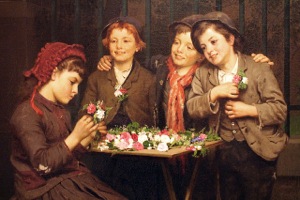Do you find your creative confidence lagging this time of year?
The holiday season is when we take time out of our busy schedules to reconnect with those we grew up with, as well as with our in-laws, extended family, and closest friends and loved ones.
It’s what makes this time of year extra special, but let’s face it: it’s not all candy and roses, at least not all the time.
Writers can face unique pitfalls when it comes to interacting with loved ones, and most are connected directly with our work, our creativity, and the effort we’ve made to become who we’ve become.
If you’re not prepared, you may suffer significant blows to your confidence and creativity—blows that make it more difficult to get back into writing once the holidays are over.
You can’t change other people, even those you love, but you can find ways to protect yourself from situations that may harm the carefully cultivated artist within.
Find yourself in one of the following five situations? Try these tips to emerge stronger and more sure of yourself without sacrificing your valued connections.
 Creative Confidence Buster 1. Your brother, sister, dad, beloved aunt, or other loved one didn’t read your book.
Creative Confidence Buster 1. Your brother, sister, dad, beloved aunt, or other loved one didn’t read your book.
Of all the people on Earth, the ones we most want to share in our success are our family members. Unfortunately, they are often the last ones to take notice, if they ever do at all.
According to author Ripley Patton, who conducted her own survey on the matter, over 99 percent of respondents said their family members basically ignored their writing.
Most said something like, “My family barely acknowledges my writing. Most of them don’t read my books.”
Many writers find themselves in this boat. Even if one family member reads your stuff, the rest probably don’t.
It can be particularly difficult to face during the holidays, when everyone is talking about what’s been going on in their lives over the past year. Of course you want to talk about your book(s), but when you do, everyone stares at you with blank looks on their faces.
It could be they just aren’t interested in what you write about. (You write romance, they prefer thrillers.) Maybe they don’t read, or they’re afraid they wouldn’t like the book, and then wouldn’t know what to tell you. The reason doesn’t really matter. How it affects you, does.
What to do?
First, ask yourself: Have you read anything your loved ones have written? Even if they don’t write books, they may write other things like reports or Powerpoint presentations or white papers in relation to their occupations.
It’s really not so unusual to be basically ignorant of the everyday activities that your family members take part in, so try not to take it personally.
Next, find something to share about your writing life that your loved ones are more likely to relate to. Tell a funny story about your editor or publisher, or talk about the challenges you faced when trying to sell your books. Draw similarities between your struggles and those of others in general, and you’ll be able to get your loved ones more involved.
 2. Your family still sees you as you were when you were growing up…and you’ve changed.
2. Your family still sees you as you were when you were growing up…and you’ve changed.
Writing has this wonderful affect on us…it changes us, but in a good way. It allows us to be completely ourselves, and the more we do it, the more confident we become. We blossom into our artistic selves, and grow more comfortable being that person we always knew we could be, but whom we may have hidden away in the past.
Our family members usually don’t get to witness that change. Unless you live near them, you probably see them only a few times a year, which usually isn’t long enough for them to register who you really are now.
Your parents may be somewhat aware of what you’re doing, but are likely to still see you as the child they raised. They may be proud of your efforts, but want you to continue to fill the role you did as a youngster—the dutiful daughter, the helpful son, etc. You may struggle against these viewpoints, and wish they could see more clearly the person you’ve become.
If you have siblings that pay attention to what’s happened with you since you all left the nest, count your blessings. In most cases, they’re likely to see you as you were when you were growing up, and that can be difficult when you come up against it at holiday time. Old stories can remind you of old troubles that you thought you left behind, or bring up old insecurities.
When the “New You” is Challenged
Realize that the “new you” is going to be challenged when you’re around folks who are most familiar with the “old you.”
Since you did spend so much of your early life around your family members—and during that time, maybe you were unsure of yourself or just figuring out what you wanted to do—you’re going to feel the “pull” of old habits and may be tempted to just go along.
There’s nothing wrong with being a dutiful daughter or helpful son for a few days if it makes your parents happy. There’s no harm in sharing a ribbing with your siblings or playfully arguing over who got the upper hand when.
But sometimes you may come up against scenarios that could take you back to a place you don’t want to be.
What to Do?
To help you resist falling backwards, take along some key reminders of who you’ve become.
You could stash a copy of the books or other writing pieces you’ve had published in your suitcase, just so you have something concrete to hold that will serve as a symbol of your accomplishments. You could wear a piece of jewelry or clothing that has a unique meaning to you and your creativity.
Maybe you’ve adopted a new practice such as a regular walk or a period of meditation to help you stay in contact with your muse. Don’t give up that practice during your visit.
Realize that who you were then is in the past. Be patient with your loved ones. Laugh off the old references, and then see if you can find a way to introduce others more thoroughly to who you are now.
You could write a funny story about the family and read it to them at a gathering, or get everyone together to brainstorm characteristics for a new character you’d like to put into your book. By getting them involved, you may help open their eyes to how their loved one has grown, but even if you don’t, at least you’ll have a little fun in a way that feels more comfortable to you
Creative Confidence Buster 3. So-and-so family member just doesn’t get what you do, so they make fun of it.
People do weird things when they don’t understand something.
Many writers, unfortunately, have to deal with loved ones who just don’t get it. They don’t understand why you’d want to pursue writing in the first place, and they don’t understand what it involves, or what value it has, especially if you don’t earn money from it.
Even if you do earn money, though, particularly if you work at home, you may have to face some ribbing about how you work in your pajamas and you sleep ‘til all hours, with the underlying message being that you don’t really work, you just dink around.
This can be one of the most difficult things to come up against during the holiday period. Most writers work really hard, so to have someone insinuate that you don’t can really sting, and may make you angry.
Typical comments might be, “Well some of us work for a living,” or “If I had your hours I’d have no problem fitting in my exercise routine!” Then there is the all famous, “Well it must be nice just to stay at home all the time.”
What to do?
About all you can do in this situation is go along. Swallow your retorts, nod your head, and smile.
After all, it is nice to work at home, if you do, even if it means that you work more hours than most people who work in an office. You know how challenging it is, but you’re never going to be able to convince someone else of that, so there’s no sense in trying.
Envy May Be Present
Keep in mind that the ones who are mocking you may be jealous. Maybe that cousin or sibling who’s going on about your sleep habits has worked in the same boring job for decades and would give anything to get out of it, but can’t seem to take action to make it happen.
As a writer, you are taking concrete action toward your goals—something others may wish they could do, but haven’t been able to accomplish yet. That could make you a target.
Those who are close to you are likely to feel envy even more keenly than friends and acquaintances, because they are so deeply connected to you. What you do sends ripples through their lives, whether they want them to or not. Even if you’re setting a good example, it may challenge your loved ones to the point that they lash out.
Do your best to understand. When it starts to get under your skin, feel free to bite back a bit if you’ve got a good sense of humor, or just simply change the subject.
 4. You realize that no one really wants to hear about it.
4. You realize that no one really wants to hear about it.
Writers, like anyone, can have unreasonable expectations about the holidays.
You may imagine telling everyone about your new book, for example, or sharing what it was really like to self-publish your first title.
Let’s take a moment to squash those expectations right now. Just twist your toe over the top of them, because the reality for most writers is…no one really cares.
Writing a book or publishing a book or running your own publishing business may be the end all to you, but for most people, it’s just not that interesting. Most people would prefer to talk about themselves.
So don’t be surprised if the age-old family friend asks you about your new release, and before you get two words out, launches into the idea she once had for a novel that she never got around to writing.
It hurts to realize that even if some members of the family think it’s cool that you’re a writer, even your mom is unlikely to want to hear about it for more than five minutes at a time (if you get that long in!). You may feel deflated and incomplete being unable to share something that is so important to you.
What to do?
Be prepared. Remember that people have short attention spans these days. They come to holiday get-togethers to laugh and have a good time, so keep your answers to any writing-related questions to a sentence or two at most.
Lower your expectations and focus more on enjoying yourself and finding out more about your loved ones than about sharing your writing world. Save that for your writing friends—the ones who will really understand.
Creative Confidence Buster 5. When visiting family, you feel misunderstood and off-center.
Some writers actually dread the holiday season because of how visiting family makes them feel. You may be one of them.
Maybe when you’re around family, you feel so completely misunderstood that you lose your footing and don’t know how to proceed. Perhaps your parents always believed you’d grow up to enter a certain profession, and when you decided to become a writer instead, they felt betrayed.
Maybe your siblings saw you as the shy, introverted child who never excelled in school, so they still treat you that way despite the fact that you’ve published five books, become an excellent workshop presenter, and won several writing awards.
The rest of your family may value other things that have nothing to do with literature or books or publishing, and when you’re around them, you may question why you got into this business in the first place.
Whatever the situation, when you step back into it, you may feel like you’ve lost everything you’ve worked so hard for, and begin to question yourself, leading to a difficult period of self-doubt.
What to do?
Realize that how your family members react is more about them than about you.
In addition, their responses are more likely to reflect how they think about you, rather than how they feel about you, and that can be an important distinction. Try to remember the expressions of love they’ve shown you along the way, and realize that in the end, that love is still there.
Then think about how you see your family members. Most likely, it’s the same way—you see them mostly as they were when you were growing up, or in the roles they played related to you.
They may have changed too, but the truth is that you will always see them as brother, sister, mom, dad, etc. Your brother may have gone on to be a celebrated neurosurgeon, for example, but to you, he will always be the guy who broke the heads off your dolls.
Maintain Your Creative Footing While You’re Visiting
You also need to keep your footing during your visit. There are a few ways you can do that.
First, schedule in regular breaks when you can get away. Even a half-hour to yourself can help you get centered again so you don’t feel so out of sorts. Make arrangements so you can maintain your freedom while you’re visiting. Rent a car, for example, rather than rely on your loved ones to transport you.
Second, consider keeping a journal over the holiday period. Note the circumstances that get under your skin, and your responses to them. When you get back home and start into the New Year, read through your notes and see what you can glean from them. You may learn something about yourself that you can use to help boost your confidence next time around.
Next, try to remember what you were like as a child, and realize your family is still operating in that mode. That doesn’t mean you have to, though. Stand up for yourself if you need to, but most of all, try to stay peaceful inside in the knowledge that you know who you are now, regardless of what your family may think.
Realize that your self-knowledge is what’s important, and that your family doesn’t have to completely understand to still deserve your love and support. Neither do you have to morph into the person they remember to deserve their acceptance.
Finally, check out this quote from Ralph Waldo Emerson. You may want to take it with you:
“Is it so bad, then, to be misunderstood? Pythagoras was misunderstood, and Socrates, and Jesus, and Luther, and Copernicus, and Galileo, and Newton, and every pure and wise spirit that ever took flesh. To be great is to be misunderstood.”
How do you survive the holidays with family?




Happy Holidays Colleen! I love all the sage advice you’ve provided in this post – it’s not only applicable during the Holidays, but all year through. I’m sure most of us have experienced at least one and most likely more than one of the scenarios presented.
Thanks, Kate! To you as well! Yes, we have to stick together at the holidays and all year through, as you say. Other writers get it! :O)